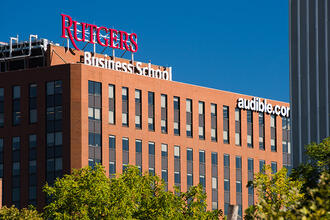
The Rutgers MBA Office of Career Management is instrumental in helping Rutgers students land jobs in New Jersey's leading industries.
Students graduating with a Rutgers MBA benefit from robust New Jersey job market
With a booming economy in the state of New Jersey and the close proximity to New York City, Rutgers Business School MBA graduates are taking advantage of a robust job market.
Most Rutgers Full-Time MBA graduates find a job in New Jersey in part because it has experienced some of the fastest job growth of any state in the Northeast. The Garden State is also home to 13 companies on the Fortune 500 list.
“The unsung hero is the New Jersey economy,” said Dean Vera, assistant dean and director, MBA Office of Career Management at Rutgers Business School. “If you want a job in this region, with easy access to New York City, the greatest city in the world, New Jersey has a very strong economy, with a lot of industries and a lot of depth in those industries.”
Sandwiched between New York City and Philadelphia, New Jersey also offers easy access to both cities for those seeking job opportunities beyond the Garden State. Top industries in New Jersey include life sciences, technology, manufacturing, financial services, logistics, healthcare, clean energy, film and media, and food and beverage [See Rutgers MBA employment outcomes].
Aditya Dharankar knows well the power of New Jersey’s economy, having landed a job at Dell Technologies as a senior advisor in large order planning. He graduated from Mumbai University in 2010 with a bachelor’s degree in computer engineering and then worked as a software engineer at IT services and consulting companies in India for nearly a decade. When it came time for graduate school, Dharankar chose New Jersey, and Rutgers specifically. He earned a Rutgers MBA with a concentration in supply chain management in May 2023.
“I have always been passionate about technology and my previous role as a software engineer helped me build the foundation to chase my passion as my career,” he said. “After spending around nine years in software development, it was time for me to pivot to the business aspect of technologies, which has been my core interest of making people’s lives easier using technology.”
“Rutgers MBA provided me the platform to progress my dream and understand not just how technology supports business but also vice versa,” he said. “This acted as a game changer which helped me obtain my current role with Dell and continue working into something that I am passionate about.”
Dharankar also noted the diversity of his MBA cohort. “It helped me understand the views of individuals from various backgrounds and experiences,” he said. “This, I believe, was the icing on the cake of the overall MBA experience.”
New Jersey’s strong economy can result in another benefit: strong salaries.
“We have people who double their salary quite often,” Vera said. The median starting base salary after graduation (in 2022) for full-time Rutgers MBA students was $113,500 according to Vera.
Rutgers also had an impressive showing in the Financial Times 2022 MBA ranking, which showed Rutgers Full-Time MBA graduates achieved a 166 percent salary increase three years after graduation compared to their pre-MBA salary. This trend continued in the 2024 Financial Times ranking that showed Rutgers MBA graduates averaging a 147 percent salary increase. The high return on investment graduates achieve in their careers is one of the significant strengths of Rutgers Business School.
A 2005 graduate of Rutgers’ MBA program, Rohit Sood earned two degrees in New York, a bachelor’s in computer science and applied mathematics at SUNY Stony Brook and a master’s in telecommunications from Pace University.
But New Jersey, with its strong economy and top companies, was where Sood wanted to pursue his MBA. While completing the program at Rutgers, Sood had a 9-month internship at Ethicon, a Johnson & Johnson company, learning about the cross-functional nature of running a device company and gaining an appreciation for the industry. That internship at one of New Jersey’s top companies propelled Sood’s career. He is now executive vice president, EVERSANA Complete Commercialization, at EVERSANA.
“The Rutgers Business School MBA allowed me to succeed in my various roles by nurturing the foundational skills and tools to analyze and solve business problems, building a network and as a result mentors who have guided me to where I am today, and fostering a mindset of continuous learning,” said Sood, whose MBA degree had a focus in pharmaceutical management, finance and marketing.
New Jersey’s strong economy is one of three prongs helping Rutgers Business School MBA students succeed. The MBA program also provides the tools to capitalize on the plentiful job opportunities with a top-notch career management department and a curriculum that concentrates on the functional specialties that companies want, such as supply chain management, marketing, and finance. “Those are the three pillars that help make our MBA students attractive to companies,” Vera said. “Each one helps and supports the others.”
Press: For all media inquiries see our Media Kit


